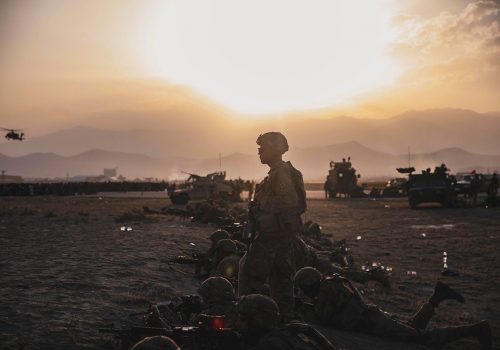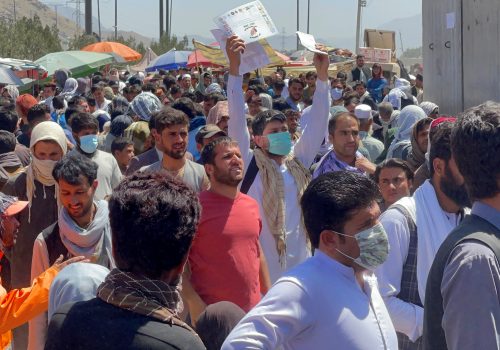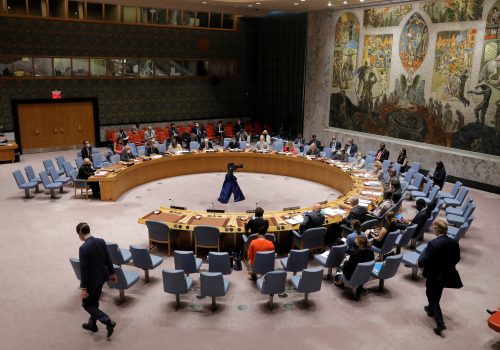FAST THINKING: The war is over, but the Afghanistan mission continues
GET UP TO SPEED
It’s done. Just before US President Joe Biden’s August 31 deadline, the last American troops departed Afghanistan on Monday, bringing a twenty-year war to its official close. Their exit follows a frantic evacuation effort that was disrupted by a terrorist attack and ongoing threats. They leave behind a country effectively controlled by the Taliban, more than one hundred stranded Americans, and untold numbers of Afghans who had sought to leave. What will continued US engagement in Afghanistan look like? How will the Taliban govern? What will become of the country’s refugees? Read on to find out.
TODAY’S EXPERT REACTION COURTESY OF
- William F. Wechsler (@WillWechsler): Director of the Rafik Hariri Center and Middle East Programs and former US deputy assistant secretary of defense
- Mir Sadat (@Dr_Sadat_USN): Nonresident senior fellow in the Scowcroft Center for Strategy and Security and former strategic adviser to two commanding generals of the war in Afghanistan
- Brian O’Toole (@brianoftoole): Nonresident senior fellow at the GeoEconomics Center and former senior US Treasury Department official
Not really goodbye
- The final troops may have decamped from Kabul on a handful of C-17s, but our experts note that the United States still has multiple missions that will keep the country engaged in Afghanistan.
- First off, the race has just begun “to see who will succeed first: the terrorists in achieving a safe haven and then building their external attack capabilities, or us constructing a consistently effective over-the-horizon counterterrorism program,” Will tells us.
- Meanwhile, the State Department will now take the lead in trying to evacuate remaining Americans and others who want out—a process the Taliban has said it will allow to proceed. Mir points out that this effort needs to extend far beyond the capital and particularly to Herat, Kandahar, Mazar-i-Sharif, and Jalalabad. “The United States can’t forget the other major cities where safety and security threats have forced people to shelter in place, no matter how much they want to come to the United States,” he says.
- Until every US citizen, green-card holder, and special immigrant visa (SIV) applicant who wishes to leave gets out, “this mission is not complete” and should be considered “failed,” Mir adds.
Subscribe to Fast Thinking email alerts
Sign up to receive rapid insight in your inbox from Atlantic Council experts on global events as they unfold.

Seeking refuge
- Some will see a business opportunity in the desperation of those still in country, Will notes: “The same set of smugglers who made so much money as people and materiel were making their way into Afghanistan over the last twenty years will now become rich once again, charging exorbitant amounts to get people out.”
- Mir says northward migrations have already begun, and Uzbekistan should brace for a flood of refugees. Friendly governments and NGOs could help these migrants by “harnessing commercially available imagery to plot safe routes away from Taliban-concentrated areas, navigate the routes, and plan for difficult circumstances like weather events,” he adds.
- Another idea to protect refugees: The Group of Seven (G7) countries could set up safe zones or “consider a blue helmet-like role for the international community in Afghanistan,” Mir suggests.
Now comes the hard part
- Without military leverage, “the United States must resort to a soft-power approach” to prevent Afghanistan from becoming a terrorist haven and protect Afghan human rights, Brian tells us.
- What does that mean? Brian points out that “the United States has dangled recognition—and the international aid that represents around half of the economy—as a reward for the Taliban governing responsibly. The stick to that carrot is the renewed use of sanctions.”
- Brian observes that the United States was “cagily silent” about sanctions as long as its troops were still in the country. Now that they are out, he argues, the US government should clarify the scope of existing sanctions and threaten additional measures “to give it much-needed leverage over the Taliban and thwart efforts by Beijing and Moscow to play spoiler,” he says.
- As terrorist groups vie for influence in Afghanistan and a resistance movement coalesces in the Panjshir Valley, Will thinks the Taliban may have as hard a time uniting the country as the United States did.
- “It is likely that a low-grade civil war will continue in Afghanistan for some time, as the Taliban learns the same lesson that we somehow never did: that no single entity can effectively control the entirety of Afghanistan as a centralized state,” he tells us. “The only sustainable system there is one that is a product of continuous negotiations, deals, and renegotiations between the center and the local powers on the periphery.”
Further reading
Mon, Aug 30, 2021
Experts react: The US withdrawal from Afghanistan is complete. What’s next?
Experts react By
What’s next for Afghanistan? How will evacuations proceed without the US military controlling Kabul airport? What’s next for the counterterrorism mission? How will other regional and global powers shape the country the United States leaves behind?
Thu, Aug 26, 2021
FAST THINKING: Terror strikes Kabul airport
Fast Thinking By
What is motivating the terrorists behind the blasts? What does this mean for evacuations? Our experts, steeped in the security world, have the answers.
Mon, Aug 23, 2021
They aren’t listed, but make no mistake: The UN has sanctions on the Taliban
New Atlanticist By Brian O’Toole
As the militant group settles in to rule Afghanistan again, sanctions remain one of the only viable points of leverage for the international community. Here's what the UN's own rules say.
Image: A Paratrooper assigned to the 82nd Airborne Division conducts security as evacuations continued at Hamid Karzai International Airport in Kabul, Afghanistan, on August 29, 2021. Photo by US Army/Master Sgt. Alexander Burnett via Reuters.


